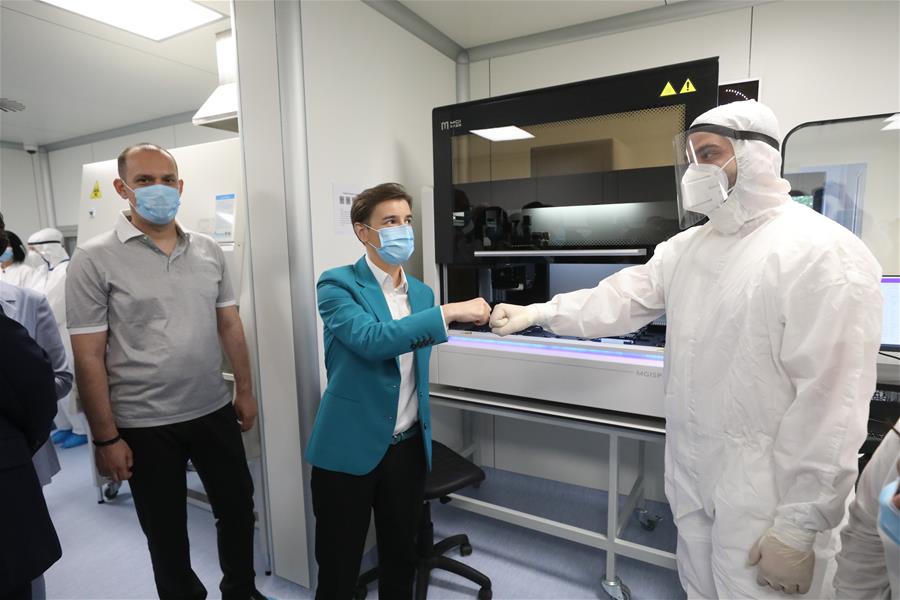
Serbian Prime Minister Ana Brnabic (C) touches fists with a lab technician at a new Fire Eye laboratory in Nis, southeastern Serbia, on July 30, 2020. The new Fire Eye laboratory for detection of COVID-19 opened in Nis on Thursday, becoming the country's second after the first in Belgrade. [Photo/Xinhua]
As the COVID-19 pandemic spreads across the world, threatening people's lives and pushing the world economy into despair, we have drawn a clear lesson: The virus knows no borders and all human beings live in a community of shared destiny.
Blaming others and shirking one's own responsibility cannot help contain the spread of the contagion or save lives. Only through solidarity and cooperation can we conquer the virus. During the hardest time in China's fight against COVID-19, many members of the international community were generous with their help. This the Chinese people will remember forever.
After the virus spread to many other countries, China also extended a helping hand, offering anti-epidemic medical materials, and facilitating purchases of much-needed supplies.
However, facing a huge threat from the novel coronavirus, certain countries, driven by political motivations, have impeded and disrupted global cooperation and spread the "political virus" of stigmatization, making people more vulnerable to the pandemic.
So far, more than 17 million people have been infected with the virus, and more than 675,000 have lost their lives.
The huge number of deaths is a wake-up call for all countries, and reminds us that only through solidarity and cooperation can we win the war against COVID-19.
In recent years, the global economy has been under growing downward pressure. The impact of the pandemic has accelerated the accumulation of risks and exposed them, plunging the world economy into the most severe recession since the Great Depression in the 1930s.
Today, like never before, the international community needs more synergy in making economic policies and taking stronger action to fight the pandemic.
But some countries are disrupting normal economic activities in trade and investment, citing national security reasons, and retreating into protectionism. The world is experiencing fierce competition between inclusiveness and isolation, win-win cooperation and a zero-sum game ideology.
History proves that isolation is not the way out. In a world where all countries are closely connected by the global industrial, supply and value chains, only by opening-up and sharing the market can we cope with the challenge and create greater development opportunities.
If we don't try to reopen the cutoff channels in the global market, and instead set up blockades to the flow of materials and people around the world, the world economy will experience an even bumpier road to recovery.
Since the pandemic broke out, under the leadership of President Xi Jinping, China has been carrying out prevention and control work and promoting social and economic development in tandem, minimizing the fallout of COVID-19.
Now, with a host of measures and policies in place, China has largely controlled the epidemic at home, with production and businesses going back to normalcy, the national economy recovering, and foreign trade and investment stabilizing.
China has also shared in a timely manner epidemic-related information and its experience in containing the disease with the international community in an open, transparent and responsible manner. China fully supports the leading role that the World Health Organization plays in coordinating global efforts.
It has donated $50 million to the WHO and provided emergency medical supplies to more than 150 countries and international organizations. China is willing to have closer exchanges and cooperation in the development of treatments and vaccines, and shoulder its global responsibility and safeguard people's lives.
In terms of socioeconomic development, China sticks to the principle of making progress while maintaining stability. It has rolled out a more proactive fiscal policy, a prudent monetary policy, and an employment-first policy.
China will increase its fiscal deficit by 1 trillion yuan ($143.4 billion) this year, and issue 1 trillion yuan of government bonds and 1.6 trillion yuan of special local government bonds to mitigate the economic fallout from the novel coronavirus.
The government also plans to cut fees and taxes by 2.5 trillion yuan to help enterprises tide over the difficulties, reduce financing costs and meet the financing needs of the real economy by lowering reserve requirement ratios and interest rates, and through re-lending.
The Chinese government has also aligned its fiscal, financial, investment, industrial and trade policies with the employment policy to strengthen coordination and virtuous interaction between economic growth and employment.
In international trade and investment, China has been adhering to the policy of opening its doors wider and promoting the liberalization and facilitation of trade and investment.
This year, China has significantly shortened the negative list for foreign investment access, and plans to unveil a negative list for cross-border service trade by the end of the year. Items on the negative list for foreign investment access have been cut to 33, a drop of 65 percent from 95 in 2017.
China is also preparing for the third China International Import Expo to further raise imports so that other countries can tap into the largest market in the world.
Moreover, China is working together with other members of the international community to jointly build the Belt and Road Initiative and deepen mutually beneficial cooperation to inject new impetus into the world economy.
The year 2020 is an extraordinary year. Standing at a new juncture of history, we face two choices-one is to join hands to win the war against the pandemic and revive the economy, and the other is to allow the virus to wreak havoc around the world and kill more people. People around the world will make the right decision.
The author is president of the Chinese Academy of Social Sciences.
(By Xie Fuzhan | China Daily Global)







